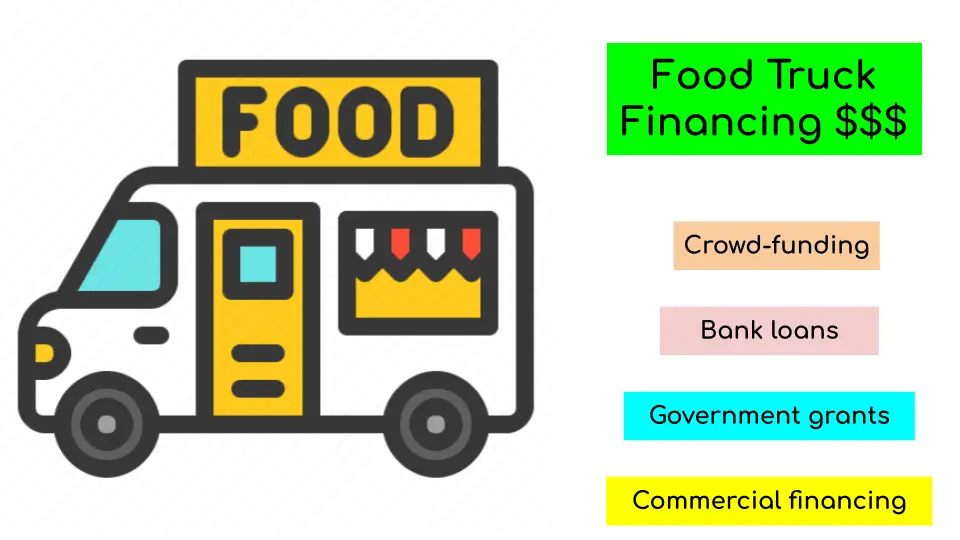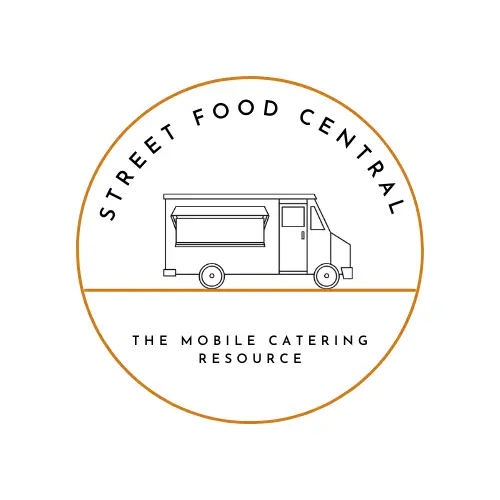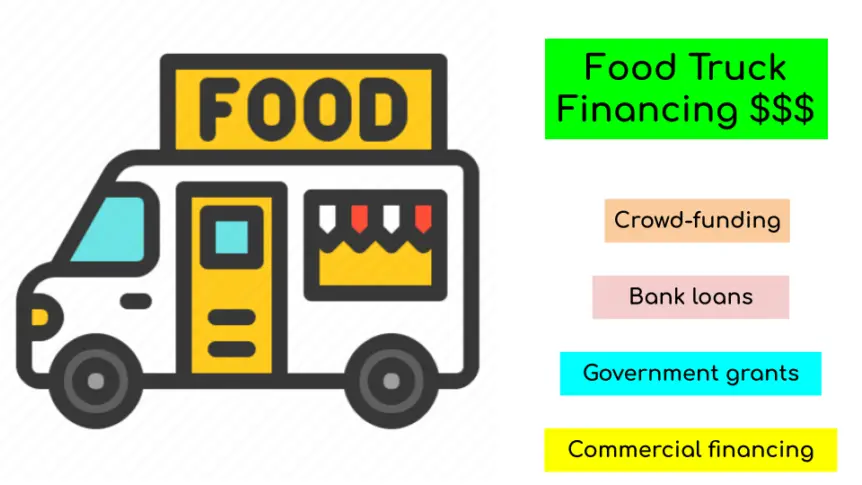See 9 ways to get financing for new and existing food truck businesses

Starting a food truck business can be an exciting prospect as it has a relatively low barrier to entry and is cheaper to get up and running than a brick-and-mortar business such as a restaurant or cafe.
However, you will still need some money to get started which can be one of the most daunting tasks when starting any new business. One of the reasons is there are a number of different ways you can get funding.
So how can you get financing for a food truck?
The best way to secure financing for a food truck is by either using savings, raising money through family and friends, or getting a government grant. Other options include government-backed low-interest loans, zero-percent-interest credit cards, and food truck leasing.
There are also a number of other options available to get financing for a food truck which I will go into more detail along with the pros and cons of each funding method.
Read on for 9 ways to get financing for a food truck business …
Contents:
- Business plan
- Personal savings
- Family & friends
- Government grants and loans
- Business bank loans
- 0% interest Credit Cards
- Leasing
- Crowing Funding
- Angel investors
- Commercial finance companies
- Key takeaways
Business plan
The first thing you should do before applying for any loan or financing for a food truck business is to create a business plan.
This gives lenders an insight into your business such as start-up and operating costs and projected gross and net profits, which helps them make a clearer decision on deciding the terms of any loan.
Things to include in your business plan:
- Concept (what products will you sell?)
- Differentials (how will your product be different from the competition?)
- Business vision (where do you see yourself going?)
- Target market (who will be your main customers?)
- Competitors (who else is in your industry?)
- Marketing strategy (how will you get your name out there?)
- Start-up costs (how much will it cost to be fully operational?)
- Financial projections (how much losses/gross/net profit do you expect in the first 1-3 years?)
- How much do you need to borrow?
Helpful resources
1. Personal savings
The best way to fund any new venture is the money you may already have in a savings account. This helps to minimize the risk associated with starting a new business and helps in the long term to reduce any outstanding debts.
If you don’t have much in the way of personal savings then it may be worth using a side hustle or existing full or part-time job to fund your new food truck start-up. This is what I did when I started my first mobile catering business!
Pros
- No money owed to debtors if the business fails
- Credit rating will be left in good standing
Cons
- Funds may be limited meaning slower progress and growth
2. Friends and family
The next best way to finance a new food truck business is to get a loan or donation from family and friends in return for a very low return stake in your new company.
This way you will have people onboard that really care about you and your business and may even be able to lend some expertise when needed.
GoFundMe is a crowding sourcing platform and a good way to automate this process by creating a personal campaign for your friends, family, and even the wider public to donate to your new venture.
Pros
- No money owed to debtors if the business fails
- Credit rating will be left in good standing
- Can leverage expertise
Cons
- Funds may be limited meaning slower progress
- Family dynamics can hinder in some cases
Useful resources:
3. Government Grants & Loans
Governments have pots of money that are often allocated to local governments to encourage entrepreneurship. This is then distributed out to the wider economy as small business grants and loans to new start-ups and expanding businesses based on certain criteria.
A good place to start searching for government grants and loans for a food truck business is on the Gov.UK website if you are a UK-based food truck start-up or the Small Business Administration for people based in the US.
Gov.UK (UK)
The Gov.Uk website has a database where you can search for grants and loans for new and existing businesses from a range of organisations, institutions, and government bodies based on different criteria.
For example, you can filter for grants for new start-ups and it will bring up a list of agencies that offer grants on this basis.
Go to Gov.UK, Finance and support for your business
Small Business Administration (US)
The Small Business Administration (SBA) is a federal government agency that can offer small business loans through a scheme called Microloans for businesses such as new food truck start-ups or established companies looking to expand.
They can offer up to $50,000 for things like equipment, supplies, inventory, and working capital through a wide range of intermediaries.
They also provide limited grants but it seems to be based on strict criteria which means this type of funding for a food truck business may be harder to secure.
Go to US Small Business Administration
Pros
- Government grants don’t have to be repaid
- Low-interest rates
- Easier to get a loan with bad credit
- Relatively low down-payments
Cons
- Highly competitive grant and loan process
Useful resources:
Related articles:
- Best Government Grants For Food Truck Businesses
- 14 Companies That Specialize In Food Truck Finance
- 11 Tips To Start A Food Truck Business With No Money
- 9 Tips To Get Food Truck Financing With Bad Credit
4. Business bank loans
There is a wide range of banks that offer food truck business financing to start-ups and existing businesses looking to expand.
A good place to state if you are a UK-based business is the British Business Bank, which is government-owned but independently managed.
They work with a range of financial institutions such as high street banks and venture capital funds to increase the supply of low-interest loans to small businesses.
Another useful resource is Money and Forbes Advisor which both have a business loan comparison tool that shows you the most competitive loans.
If you are based in the US the US Small Business Administration is a good place to start as they can connect you with a wide range of lenders where you can compare rates and fees.
You can also go to banks directly that can offer low-interest loans for new start-ups and likely work with the British Business Bank.
Pros
- Can get you started quicker
- Increase in cash flow
- Can grow quicker
Cons
- The application process can be long
- Could lose assets for non-payment
- Will still owe debts if the business fails
- Could affect your credit rating
- Locked into a fixed payment which could be a problem if income fluctuates
Useful resources:
- British Business Bank
- Financing a Start-up
- Money
- Best Business Loans For Start-Ups
- SBA: Lenders Match
5. 0% interest Credit Cards
Credit cards are another way to raise funding for a food truck start-up. There are loads of competitive deals with introductory offers with a 0% fee on purchases for a set period.
I have used 0% interest credit cards many times over the years to buy new equipment for mobile catering businesses and to expand.
However, credit cards should be treated with caution and are not really suitable for very large purchases like food trucks. You should also pay off the card before the introductory offer ends and the high interest kicks in.
Pros
- Can get you started quicker
- Increase in cash flow
- Can grow quicker
Cons
- Only good for smaller purchases like equipment
- High interest rates after the introductory period
- Will still owe debts if the business fails
- Could affect your credit rating
- Locked into minimum payments which could be a problem if income fluctuates
- Considerably more risky than a standard loan
Useful resources:
- Credit card comparison (UK)
- Credit card comparison (US)
Related articles:
6. Leasing
Instead of getting a loan to buy a food truck outright, there are other financing options such as leasing a food truck over a fixed period.
There is a range of food truck leasing companies out there that give you the option to rent a food truck on a monthly basis for as little as $500 per month over a set period (between 1-5 years).
Some companies also give you the option of hire purchase, or rent-to-hire agreements where you pay a deposit and a fixed monthly sum and own the food truck or trailer outright at the end of the contract.
Pros
- Tax advantages – leasing can off-set corporate tax
- Helps to release cashflow for additional equipment
- Minimal maintenance costs
Cons
- You don’t own the asset until the contract ends
- Monthly payments are fixed
- Can work out more expensive over time
Useful sources:
Food truck leasing companies:
- Food Trailer Lease (UK/Ireland
- Cannon Mobile Catering (UK)
- WestWon: Catering Trailer Lease (UK)
- Concession Concepts (US)
- Moodys (US)
Related articles:
- Where To Find Used Food Trucks For Sale
- 12 Types of Vehicles Used for Food Trucks
- Food Truck Manufacturers In The UK, USA & Canada
7. Crowing Funding
Crowd-funding (also known as crowd-sourcing) is where you raise a small amount of capital from a large number of people through online platforms which bring entrepreneurs and investors together.
$13.6 billion was raised globally this way in 2021, which is predicted to increase to nearly $29 billion by 2028.
Investments from these platforms come with 4 different attachments. A donation; a loan with interest; a stake in the company and a reward where the investor gets a product when the business is launched.
New Food truck owners may want to choose the loan with interest route rather than giving up a stake (equity) in a new company.
Pros
- Convenient
- A good alternative to traditional banks
- Can keep control over the company
- Can get feedback for ideas
Cons
- The application process can be long
- Can be prone to idea theft
- High platform fees
Popular crowd-sourcing websites include:
Useful resources:
8. Angel investors
An angel investor is usually an entrepreneur who has knowledge and expertise in the industry they are investing in.
However, what makes angel investors different from other forms of lenders is they usually take a more “hands-on” approach and help new business owners with guidance and mentorship to get their businesses off the ground and growing.
If they come from a food-related background, especially in the restaurant or truck industry this can add a lot of value as you can gain valuable inside experience which can help to avoid some of the pitfalls new businesses face.
A good place to find angel investors is the Angel Investment Network which is a platform that connects budding entrepreneurs with Angel Investors and covers a wide area including Europe and North America among other regions.
Pros
- Can be less formal requiring minimal paperwork
- A good alternative to traditional banks
- All industries are eligible
- Can get mentorship and guidance
Cons
- Founder shares can be diluted
- Fast growth can be expected
Useful resources:
- Angel Investors
- Angel Investment Network
- Pros and Cons of Using Angel Investors to Fund Your Business
9. Commercial finance companies
Commercial finance companies are alternatives to banks and can offer businesses of any size access to loans faster for things like new equipment and expansion.
However, it’s worth noting that this type of financing is prominently for existing businesses that already have a turnover and not new startups with an unproven concept.
Pros
- Provides cash flow
- Easier access to funds than banks
- Can maintain full business ownership
- Lower interest rates due to higher competition
Cons
- Loan terms are often not flexible
- Risk of losing assets if you default on a secured loan
Useful resources:
- What is Commercial Finance? Everything You Need to Know
- What Are The Top Pros and Cons of Commercial Business Loans?
Key takeaways
New ventures are always risky, especially if you lack the experience and are going into a completely new industry.
The best way to finance any new food truck venture is to raise the funds yourself through savings, a side hustle or a job, or through family and friends. A government grant is also a good way to secure funding as there is nothing to pay back.
That way if things don’t go to plan you won’t have a failed business with the added pressure of owing money to creditors.
If you can’t raise the full funds a combination of the above and a small business low-interest government-backed loan is another good option to keep the risk low.
Other higher-risk financing options include business loans from traditional banks, and commercial finance companies, getting a short-term lease contract on a food truck, or using zero-percent interest credit cards for equipment.
Gavin D is the founder of Street Food Central and Tru Foo Juice Bar Co. and has worked in the mobile catering industry for over 7 years.

